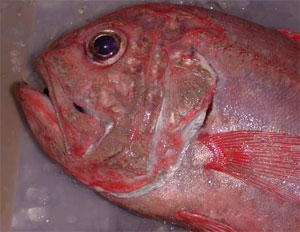Government subsidies drive deep-sea fish depletion
Government subsidies drive deep-sea fish depletion
mongabay.com
February 18, 2007
Saturday an international team of economists and scientists called for a ban on government subsidies that drive deep-sea trawling. Biologists say the practice is destroying the world’s fisheries.
“Industrial fisheries are now going thousands of miles, thousands of feet deep and catching things that live hundreds of years in the process – in the least protected place on Earth,” said Elliott Norse of the Marine Conservation Biology Institute.
The call was announced in a press conference at the American Association for the Advancement of Science Annual Meeting (AAAS) in San Francisco.
“Deep-water trawlers or draggers account for about 80% of the bottom fishing catch from the high seas,” explained a statement from SeaWeb, an ocean conservation group. “In a few hours, the massive nets that drag the bottom and weigh up to 15 tons, can destroy deep-sea corals and sponge beds that have taken centuries or millennia to grow. The trawlers target fish such orange roughy and grenadiers for food, and sharks for the cosmetic industry. These fish are generally long-lived, slow growing and late maturing so their populations take decades, even centuries to recover.”
|
Orange Roughy, image courtesy of R. Waller in the NE Atlantic (NOAA).
|
Deep-sea fishing occurs in international waters where it is largely unregulated, producing a “tragedy of the commons.”
“The unregulated catches by these roving bandits are utterly unsustainable,” said Robert Steneck, of the University of Maine. “With globalized markets, the economic drivers of over-fishing are physically removed and so fishermen have no stake in the natural systems they affect. While it may be a good short-term business practice to fish out stocks and move on, we now see global declines of targeted species.”
Researchers have found that deep-sea fishing is only viable thanks to “heavy government support.” Studies by Rashid Sumaila and Daniel Pauly of the University of British Columbia Fisheries Centre indicated that over $152 million US are paid to deep-sea fisheries annually. Without these subsidies, global deep-sea fisheries would actually operate at a loss of $50 million per year. Sumaila and Pauly say that most of the subsidies go towards fuel costs.
“There is surely a better way for governments to spend money than by paying subsidies to a fleet that burns 1.1 billion liters of fuel annually to maintain paltry catches of old growth fish from highly vulnerable stocks, while destroying their habitat in the process,” said Pauly.
“Eliminating global subsidies would render these fleets economically unviable and would relieve tremendous pressure on over-fishing and vulnerable deep-sea ecosystems,” said Sumaila, an economist.
“From an ecological perspective we cannot afford to destroy the deep-sea. From an economic perspective, deep-sea fisheries cannot occur without government subsidies. And the bottom line is that current deep fisheries are not sustainable,” he added.
This article is based on a news release from SeaWeb.








